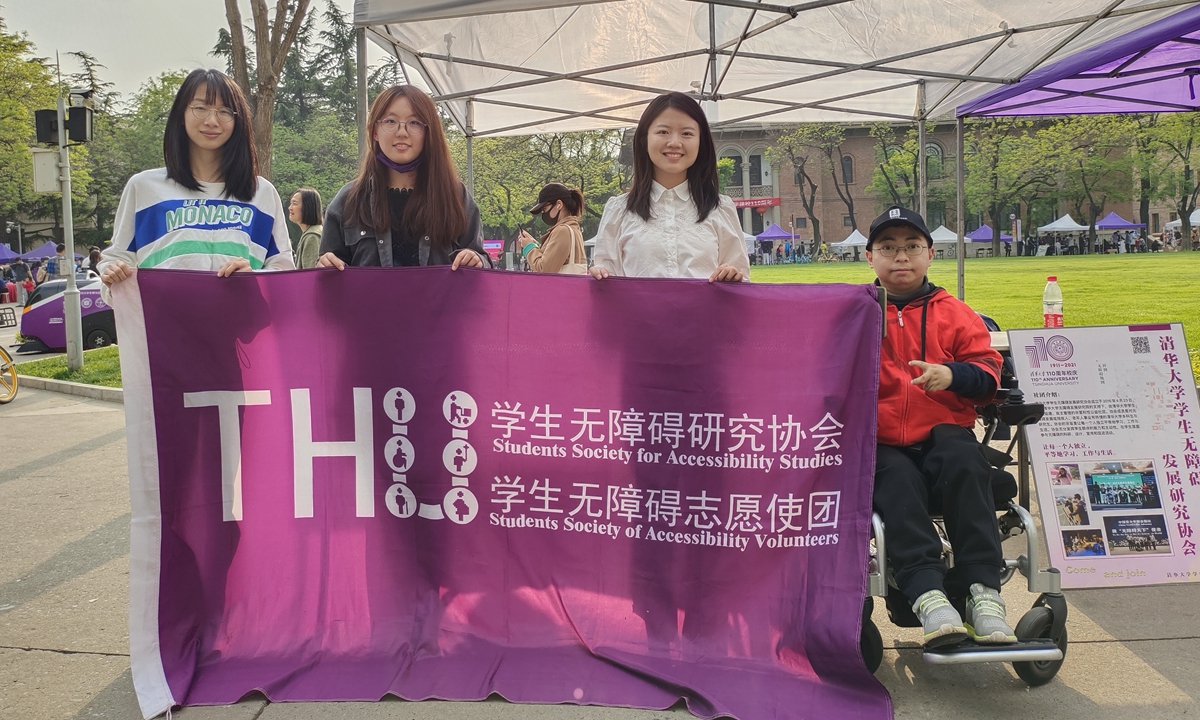ARTS / CULTURE & LEISURE
Student with hearing loss moves China, hails efforts to protect rights of people with disabilities
Silent world, passionate heart

Jiang Mengnan (2nd from right) attends a volunteer event with schoolmates. Photo: Courtesy of Jiang Mengnan
Role model for the young generation, a fledgling bird taking her first flight, a living miracle… When talking about these labels that Chinese netizens and media have tagged her with after she won the annual People Who Moved China award together with Nobel Prize-winning physicist Yang Zhenning and legendary Chinese sprinter Su Bingtian, Jiang Mengnan shook her head."I don't think I deserved such a great honor as I am just an ordinary girl enjoying an ordinary life," she said with a shy but bright smile.
It is just such an "ordinary" girl that the times may need most as her optimistic, persevering and tenacious spirit in the face of fate's obstacle - she lost her hearing when she was 6 months old - has given hope to millions and will continue to encourage more "ordinary" people to explore the meaning of life.
"Not everyone can become a superstar like Gu Ailing, but we can strive to be a 'Jiang Mengnan' when facing ups and downs," many netizens said.
Plain but not simple
Jiang was born in 1992 in Central China's Hunan Province. Her poetic name represents the hopes her parents, both teachers, had that she may live a peaceful and tranquil life. However, a high fever in the middle of the night led to the loss of her hearing when she was only 6 months old.
Due to a side effect from ototoxic medicine, Jiang suffered from extremely serious deafness.
"My parents put my hand on my throat so I could feel the vibrations, and on their mouths to let me feel their breath. They guided me to watch their shape of their lips to learn how to speak, repeating one word thousands of times," Jiang told the Global Times.
Due to her parents' training, Jiang was able to attend an ordinary public school. Sitting in the front row, she followed the classes by reading the teachers' lips. Driven by a strong passion for knowledge, she quickly leapt to the top of the class.
"I am not a genius. I see myself as an ordinary student who has always been persistent, industrious and brave in overcoming obstacles," Jiang said.
After graduation, Jiang made a bold decision. She left her hometown and went to Jilin Province in far Northeast China to chase her dream of becoming a doctor and saving people's lives.
She continued to pursue her graduate degree at Jilin University, where she chose computer-aided drug design as her research direction on the advice of her teacher.
In 2018, she was accepted into China's leading college, Tsinghua University, embarking on a new life focusing on the establishment of models which will be used for combating COVID-19 and cancer.
In 2020, Jiang was elected as the president of the Tsinghua University Student Barrier-free Development Research Association. This new position allowed her to see the importance that the school attaches to the establishment of a barrier-free environment.
"Creating a barrier-free environment is not only a matter of providing Paralympic personnel with convenience, it also helps build a better society," Jiang said.
In November 2019, Beijing launched a three-year campaign to make the city more accessible. Around 336,000 sites and 12,000 buses in the city have completed barrier-free renovations since then.
Dignity for all
Jiang's life has also witnessed China's tremendous efforts and advancements in helping people with disabilities.
As Chinese President Xi Jinping has said, "not a single person with disabilities should be left behind when China has completed the building of a moderately prosperous society in all respects."
Jiang said the country's efforts to safeguard the rights of people with disabilities have made them "feel they are being treated with more dignity."
In 2019, when the country was celebrating its 70th birthday, the Chinese government issued a white paper on the country's efforts to protect the rights and interests of persons with disabilities over the past 70 years. The white paper identified that China had around 85 million people with disabilities at that time.
About 30 million people in China have hearing impairments, among them more than 20 million are aged 60 and above and about 137,000 are children aged 6 and under. Every year, about 20,000-30,000 newborns are identified with hearing problems.
For decades the government has been working to improve social services for this group. There have been many improvements for people with hearing impairments in China, especially in the areas of education, language and health care.
In 1999, China initiated the Universal Newborn Hearing Screening program. Under this program, newborns from low-income families receive pre-screenings for hearing-aids, as well as pre-screenings for cochlear implants.
China also provides free hearing aids to people who have hearing problems. For example, in 2021, 5,912 children in East China's Shandong Province were provided with free cochlear implants. In total, 11,000 people with hearing impairments were given free hearing aids in the province that same year.
In recent years, as the country was preparing for the Beijing 2022 Paralympic Games, the Chinese government focused on helping building a sense of self-worth and pride among individuals with hearing impairments.
"We don't need extra help nor special treatment. All we need is equality and respect," Jiang noted.

